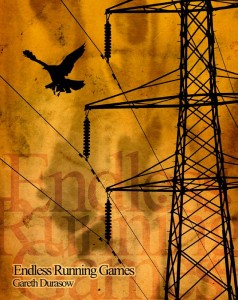Poet Gareth Durasow gives us an insight into his latest collection, Endless Running Games which is being launched on Sunday 19th July at Outlaws Yacht Club, Leeds.
 A wasted youth is better by far than a wise and productive old age
A wasted youth is better by far than a wise and productive old age
– Meat Loaf
I have a thing about daft opening quotes – a send-up of the tradition where authors use someone else’s wit or insight as a kind of literary coat stand. Had Jeremy Clarkson not given me a better opening quote for my new book, then Meat Loaf’s refrain from Everything Louder Than Everything Else might have fitted the bill.* Even if I don’t agree with it.
Another opening quote that would have worked is “Gareth writes for the Xbox generation“; the supposedly pejorative parting shot in a review about my poetry from a few years ago. It was this quote that made me think about the kind of poetry that could be inspired by a pursuit that is often – and in many cases, rightly – considered a waste of time. I spent a good chunk of my childhood on the Megadrive and the Amiga, and as I grew up, videogames grew up with me; their fictional worlds became more sophisticated; the graphics that realise them more impressive. It felt appropriate that the console generation was one I should write for.
I’m on my second play-through of Assassin’s Creed 4, a game where you take on the role of Edward Kenway; privateer-turned-pirate-turned-[spoileralert]-assassin-turned-[spoileralert]-family man. Once the game takes the training wheels off, you’re free to gallivant around the Caribbean islands doing whatever you like (as long as “whatever you like” involves killing or nicking stuff or making items which allow you to kill or nick stuff more efficiently). Should the mood take you, you can indulge in some casual whaling; a side pursuit which sees you chasing down one of the more majestic animals of the sea and lobbing spears until either it puts you in the drink or you kill it, at which point you’re treated to a cutscene that shows its bloody carcass being hoisted up the side of your vessel.
Make of that what you will, but in the meantime here’s a poem about whaling in Assassin’s Creed 4 (my feelings on the matter can be found in there, if you squint really hard):
Prayer for Edward Kenway
Across your outfit
a seminar in butchery,
the manpower required
to fillet Leviathan.
How many carcasses
weighted on all sides
itch to fly,
to preserve their bones
and maternal instinct.
It’s in their code to be game,
an earthquake padlocked
onto my heart
when a live one breaches,
its aftershock
beneath the city of my scalp
and the seabed
reassembled by crustaceans,
clawed things
the names of which
I cannot tell you,
a flash mob of detritivores
making good use of
a man-o-war’s hand-me-downs.
Earth will eat them raw;
sludge recalling Neptune’s acres,
a worthier life to be had ashore
where sirens are a novelty.
Take as long as you like at your bookcase,
take an Odyssey.
While putting these poems together, I paid attention to the arguments used by other videogame enthusiasts to justify the time we spend committing violence upon those who are unfortunate enough to exist in a videogame. The idea that interested me most was that the best videogames should be held in the same regard as the best films and the best literature. It’s a tempting rationale for a gamer to get behind. An expansive open-world RPG (Role-Playing Game), with a team of talented writers and designers behind it, can immerse you in a setting that is a great place to visit for whole days of your life, but one where you wouldn’t want to live for even a minute. This kind of immersion, where you become the protagonist, is the first person singular taken to the extreme, and it’s even more effective when it comes to horror. Horror in movie form, where you watch the hapless hero inch their way ever closer to the encroaching evil, is no match for good horror in videogame form: where you are the hapless hero and you’re trying your damnedest to not trip over every tree root and blade of grass between you and the next save point. Videogames give you an unsurpassable sense that it is you for whom the stakes are high. Experiencing that kind of agency has to beat time spent at the supermarket putting things in a trolley.
The counterpoint to all this is that great films and novels are intended to take up a few hours of your time. They have a definitive endpoint. If you never sit through that film or read that book again, the only extra time it will take from you is the time you spend thinking about or discussing it. Were a videogame published with this mentality, the publisher would have a commercial failure on their hands. Videogames are designed not so much as to enrich your life for a relatively short period, but to work towards replacing it indefinitely. From the publisher’s point of view, the longer the game can keep you playing, the better. This is the aspect of gaming that from time to time keeps me awake at night thinking about what I’ve been doing with my life.
Videogames boil down to reward systems; an experience that on a moment to moment basis has to seem more fulfilling than spending the equivalent amount of time living actual life here in meat space. If you put x hours into levelling your sorcerer alter ego in a hack-and-slash slaughter-em-up, you know they’re going to be more accomplished, more capable at what they’re already very capable at, and probably dressed in sexier armour too. Put the same amount of time into trying to find a better job or learning to play the piano, and you can’t guarantee you’ll have anything to show for it.
The worst culprits are the games that offer you a steady stream of superficial rewards for the minimum of physical effort, or which offer an insurmountable challenge with the illusion that you will overcome that challenge if only you can tap your phone screen a little faster next time. As far as videogames go, this genre is the most abominable of time-sinks and their name gives my poetry collection its title: Endless Running Games. It is a collection about the ways in which I’ve been known to waste my time. It is about the importance of physical contact in a world where we’re being kept apart by interminable distractions. It is about the people – real and fictitious – whom I’ve met along the way and who have given me something to write about. People like this chap:
For the Last Flat Capper
The last flat cap, worn unto death by Castleford’s pantheon
faces black as the seams they dreamt of
relentless beside their wives
slate grey from lives spent stoking
men in repose behind bastion walls
made of pint pot embossed with their names
and ceramic ashtrays now for shelling nuts.
A grown man cried when sent to smoke in the open air
deceased in all but his John Smith’s arm mechanism
his winding wheel of reminiscence.
I’ll remember him after the rings have been unscrewed from his knuckles,
the roll-up filched from behind his ear, the gold tooth levered from his rictus.
He’s one of the real ones. He makes me think of a whole generation reaching their death beds with time to ruminate on the levelling up they once did, the number of times they prestiged on their first-person shooter of choice, the obstacles they negotiated a little two-legged sprite over; the sheer volume of time they put into not very much at all. Endless Running Games explores all this, but in a funnier, quirkier way than I might have let on.
You should come and see for yourself.
*On Bat out of Hell 2, during the monologue that precedes ‘Everything Louder Than Everything Else’, Meat Loaf shouts: “I REMEMBER EVERYTHING! I remember every little thing as if it happened only yesterday,” but just moments later, when referring to the guitar with which he intended to bludgeon his sleeping parents, he tells us, “I don’t remember whether it was a Telecaster or a Stratocaster”. I wonder if Jim Steinman kicks himself over that continuity error.
 The Endless Running Games collection will be launched at Outlaws Yacht Club on Sunday 19th July, with the Leeds Big Bookend and Dog Horn Publishing. This is a free event, no ticket required.
The Endless Running Games collection will be launched at Outlaws Yacht Club on Sunday 19th July, with the Leeds Big Bookend and Dog Horn Publishing. This is a free event, no ticket required.
Gareth Durasow’s poetry has appeared in publications throughout the UK, Europe and the US. He teaches English and Creative Writing for Wakefield Adult Education Service.
You can find him at garethdurasow.blogspot.co.uk and on Twitter @garethdurasow.
Endless Running Games has recently been reviewed by Mike Farren for The State of the Arts. You can read it here.

